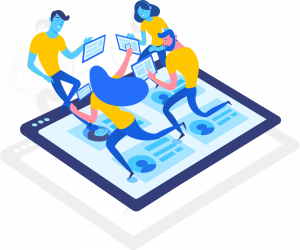Infobesity: A new growing mental disorder in children today. Symptoms, Effects, Preventive measures.
By orchidadmin |
Date 05-09-2023

Admissions Open for
Research shows that at any given point in time, every individual absorbs about 34 GB of data from their surrounding environment.
What happens when a child receives excess of information from various technological sources? More often than not, the child is overwhelmed and doesn’t know how to deal with it.
This condition is called ‘information obesity’. Infobesity is a newly discovered disorder among kids and is growing day by day at a rapid pace. Research shows that at any given point in time, every individual absorbs about 34 GB of data from their surrounding environment. This overload of information leads to Infobesity.
If children are spending a good amount of time in front of TV and mobile phones, there are two ways to handle it.
Option 1: Restrict the time children spend on TV and mobile phones.
Option 2: Provide healthier alternatives to TV and mobile phones that are attractive to children.
In a world where information is at our fingertips, are we paralyzed by knowing too much?
Infobesity Symptoms
Behavioral Changes: Children become more aggressive, fragile and irritable.
Prioritizing Irrelevant Information: Inability to pay attention and focus on a relevant piece/source of information.
Bad Decisions: If children, especially, lose sight of what’s important, they make decisions based on unimportant factors. For example, a child being influenced by celebrity lives on social media and tabloids, trying to adapt to their behavior and mannerisms. The influence is such that they lose sight on their own original personality traits and pick up a false body image.
What are the effects of infobesity?

Behavioral Changes
In children, the most obvious changes that occur are usually behavioral. They tend to become more aggressive, fragile and irritable. These emotional changes occur due to the child’s inability to prioritize the different emotions they feel about the different streams of information pouring in. They may also face an exaggerated amount of fatigue and tiredness exactly like adults do, due to the information overload. This can, in turn, make them irritable.
Prioritizing irrelevant information
Children tend to lose attention and focus from what really matters and often don’t differentiate between what does matter and what doesn’t. When children are taking in information from schools and books, the information is usually relevant and productive. They are simultaneously absorbing information from gadgets in the form of games, internet web pages, the television, etc, as they’re more entertained by information in this form than the relevant information they’re learning, they tend to prioritize the irrelevant information. This could be one of the main reasons your child is brilliant with computers and gadgets but can’t seem to retain much from school.
Infobesity: The enemy of good decisions
What this also results in, is that we often end up making bad decisions. If children, especially, lose sight of what’s important, they make decisions based on unimportant factors. An example of this would be, your child or teenager being easily influenced by tabloids and the social media portrayals of their friends’ lives and even celebrities’ lives, and doing anything they can to follow their footsteps. They forget to think about how that’s merely a portrayal and often untrue of their reality, and simply want to be that way. This can include the result of a false body image and choose to look good over being healthy which is what really matters.
How to prevent infobesity from affecting a child?

1. Teach Your Child To Priorities Information
That’s too much information! For our children, we need to create an environment in which they realize that they don’t need to retain all the information that they absorb. So step one would be, teach them to prioritize the information they receive and classify them as important and unimportant. Teach them about how certain types of information help you get where you want to go, such as gaining relevant knowledge and acquiring important skills. This results in better problem-solving abilities and hence a better future.
2. Focus On The Relevant Information
Children absorb almost any information they’re exposed to. Having a conversation with your child about what information it is important for them to use, is essential. Step two would be to talk to your child specifically about the things you want them to learn and remember. This would be the information you want them to explicitly focus on.
3. Limit Screen Time
Limit screen time. We can also encourage research through books in libraries instead of always using the Internet, and we need to work on limiting screen time for our children. This would give them room to absorb information from sources other than digital ones which is often a lot more relevant and important.
With your children’s input load reduced and your and their new understanding of the importance of internet, they now have created a space in their lives in which they can absorb the information that is most beneficial to them and have the time to engage in the thing that’s so important to raising children in this wired world, namely, thinking. The result for your children? Fewer feelings of being overwhelmed and stressed, more time to devote to important things, more thinking, and better output in their personal, family, social and school lives.
Other Related Sections
NCERT Solutions | Sample Papers | CBSE SYLLABUS| Calculators | Converters | Stories For Kids | Poems for Kids| Learning Concepts | Practice Worksheets | Formulas | Blogs | Parent Resource
CBSE Schools In Popular Cities
- CBSE Schools in Bangalore
- CBSE Schools in Mumbai
- CBSE Schools in Pune
- CBSE Schools in Hyderabad
- CBSE Schools in Chennai
- CBSE Schools in Gurgaon
- CBSE Schools in Kolkata
- CBSE Schools in Indore
- CBSE Schools in Sonipat
- CBSE Schools in Delhi
- CBSE Schools in Rohtak
- CBSE Schools in Bhopal
- CBSE Schools in Aurangabad
- CBSE Schools in Jabalpur
- CBSE Schools in Jaipur
- CBSE Schools in Jodhpur
- CBSE Schools in Nagpur
- CBSE Schools in Ahmednagar
- CBSE School In Tumkur

Call Us to know more about Orchids
Swipe Up

.jpg&w=1920&q=80)














